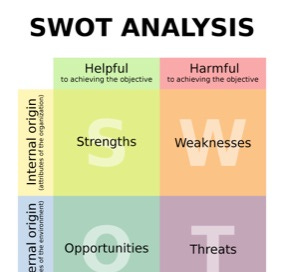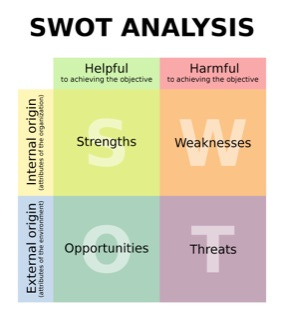Thoughts on SWOT+
The use of the Strengths, Weaknesses, Opportunities and Threats analysis method works well for business investment proposals, but must be amended for government public policy proposals.
SWOT Analysis is a popular tool
SWOT has been used by many corporate leaders for a variety of reasons. Examples include evaluating new investment to assess their market viability; considering various marketing strategies to enhance competitive market position; exploring different Information Technology options to overcome business’ shortcomings.
I recently attended a City Council meeting during which a department head delivered a presentation. When she stated that the “strengths, weaknesses, opportunities and threats” were considered in relation to the work of a committee which she oversees, I was curious. Since I have participated in many SWOT exercises as a Director of an international consulting business, I wanted to understand her use of it in a government setting.
SWOT+ Analysis is for Government proposals.
Government operations are not guided by profit and loss considerations. The availability of financial capitals is always guaranteed from taxation and public debt.
When the SWOT analysis is applied to a government and other investment situations where financial profit and loss are not factors for consideration, the ‘+’ is appended to ‘SWOT’ to signify that there will be beneficiaries of the public spending proposal ( the “winners”) and those who will be made to sacrifice (the “losers”).
In the private sector, the questions of “Who benefits?” and “Who pays?” regarding a spending initiative are clear: investors make and ROI calculation BEFORE they spend their money. Generating a positive Return On Investment (ROI) is usually their primary motive.
In the government sector, answers to these same questions are not so straight foreward.
“Who benefits?”
Since public spending can involve many stakeholders, answers to this question are obscured by an opaque wall of accountability and transparency within the government bureaucracy. Also, elected representatives also engage in the “political calculus” of supporting a spending bill which may focus more on their chances for re-election rather than any type of “ROI calculus” for taxpayers.
Government decision-makers spend “public money” with no financial risk to them personally. Their jobs are secure and errors in judgment rarely incur personal consequences while private sector decision-makers enjoy no such employment protections.
“Who pays?”
Pierre Poilivre has been a guest on the “What Is Money” podcast show hosted by Robert Breedlove. In episode 298, at minute 00:27:22, you can hear 4 minute clip from an early show called ‘Money and Government - Pierre Poilievre (WiM133)’ in which Pierre describes the attitude towards money displayed by senior officials within the Canadian Ministry of Finance. He described a meeting that he attended regarding a CDN$ 3 billion spending bill. When he asked a simple a simply question “Where is the money coming from?”, the room full of a dozen senior government officials went silent for several minutes. I will paraphrase his comments:
The sources of funding did not receive any consideration by those public officials. They seemed to have forgotten about the public is the original source of all public money! They treat our tax dollars, including public debt, as theirs to do with as they please without giving citizen sacrifices a second thought.
From my own experience in politics ( a candidate in nine elections), the use of public money to “buy votes” with expensive promises of public “freebies” is common and popular with Liberal, NDP, Green and (to a lesser extent) Conservative parties’ candidates. Libertarian candidates, like me, promote the opposite message. We advocate for less government and for citizens to pay much less in taxes. This suggestion falls on deaf ears in most cases. Evidently, Canadians love their taxes! Go figure.
I use SWOT+ in my ebook publications.
Chapter 3 of What To Do About CLIMATE CHANGE - A Libertatian Proposal is dedicated to a SWOT+ Analysis of The Bigfoot Show. ‘Bigfoot’ is the main proposal of the ebook.
I will soon be adding a SWOT+ chapter to Digital Direct Democracy - A Libertarian Antidote to Digital Communism, a short ‘citizen white paper’ proposal.
Both are available on Amazon as Kindle ebooks. I will soon identify them as part of a Kindle series “Libertarian Proposals”. Hopefully, over the next few years, I and other Libertarian writers will build a library of short ebooks (~ 30 tablet-size pages) to flesh out our ideas using the SWOT+ Analyis approach.
The SWOT+ Analysis approach is a Libertarian idea
I originated this idea hoping to make it a Libertarian standard since I am well-connected with the leaders of the Canadian and Ontario Libertarian parties. Ideally, all Libertarian political candidates across Canada will be able reference specific Libertarian ebooks. I refer to them as “citizen white papers” to distinguish them from institutional white papers funded by taxpayers. If referenced frequently during political campaigns, voters will recognize that Libertarians are thoughtful, transparent and accountable to the taxpayer. We have nothing to hide, no “hidden agendas” or “bait and swith” election strategies.
Maybe, in time, Libertarians will shame all of the Big Government political parties into copying our approach to achieving a better-informed electorate. This is crucial to achieving a unified and civil society.
With advanced in artificial intelligence tools like CHAT 4.0, the contents of these Libertarian Proposals series will become readily available in an AI-summarized form by the majority of voters by 2030. The days is coming when a generation of citizens will employ an AI Assistant to help them made voting choices. The SWOT+ analyses will provide a high quality of accurate content for future CHATs to sample if we begin to build that digital content now.
An AI Assistant for Political Choice is coming soon.
Humanity is overwhelmed by too much information. Many citizens are likewise overwhelmed by too much political information and confused about how conflicting and politically-partisan public policies they affect the many domains of their lives including employments, housing affordability, the decision to marry and raise children, career choices, and many more. Economics and claims of a Climate Crisis are just an slice of the many complex domains of authority controlled by Canada’s three levels of government.
This information overload situation makes many citizens want to stick their heads in the sand and ignore all of it. Yet, they still want to exercise their right to vote.
Tools like CHAT 4.0 were inevitable to solve this information overload problem. These CHATs, however, are in their infancy. The more mature versions that are currently in R&D settings, will eventually flood society in the same way that iPads and other tablets have done in recent years, only with much more power to influence people and their choices. Even the most politically phobic and illiterate voters will likely turn to CHATs to help them assess their voting options.
Time will tell if AI will lead to more robust democracies, or to more autocratic forms of Crony Statism, Crony Capitalism or even the type of Crony Communism like that being imposed on a billion+ Chinese citizens under the leadership of the Chinese Communist Party and Chairman Xi.
I am betting that Democracy will prevail for Canadians, but only if we fight to keep it.




